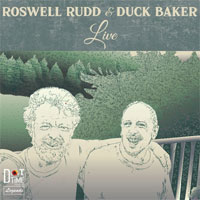Roswell Rudd & Duck Baker • Live
 ingerstyle guitarist
Duck Baker and trombonist Roswell Rudd had bonded over mutual love of jazz pianist Herbie
Nichols, circa Baker’s 1996 Nichols recital Spinning Song. They share a
no-boundaries attitude and a few areas of interest. Baker’s music encompasses folk
picking and free play. Rudd was a college Dixielander in the 1950s turned exuberant
free-jazzer in the ’60s, hearing continuity between those styles that embrace
collective improvisation. His bellowing sound and headlong momentum made his rep. Later he
dropped out, playing show tunes at Catskills resorts, before a glorious comeback starting
in the ’90s. (He died in 2017.) Rudd’s musical knowledge was broad; I once heard
him expound on Islamic-influenced ecstatic improvising in ninth-century European
liturgical chant. The Rudd/Baker duo’s Live is culled from a 2002 gig at New
York’s Tonic, recorded by Ben Young, and a 2004 show at Albuquerque’s Outpost,
engineered by Steven Schmidt. (Baker’s previous 2021 CD Confabulations, on
ESP, improvised duos and trios, includes a couple of numbers with Rudd from that Tonic
show.) ingerstyle guitarist
Duck Baker and trombonist Roswell Rudd had bonded over mutual love of jazz pianist Herbie
Nichols, circa Baker’s 1996 Nichols recital Spinning Song. They share a
no-boundaries attitude and a few areas of interest. Baker’s music encompasses folk
picking and free play. Rudd was a college Dixielander in the 1950s turned exuberant
free-jazzer in the ’60s, hearing continuity between those styles that embrace
collective improvisation. His bellowing sound and headlong momentum made his rep. Later he
dropped out, playing show tunes at Catskills resorts, before a glorious comeback starting
in the ’90s. (He died in 2017.) Rudd’s musical knowledge was broad; I once heard
him expound on Islamic-influenced ecstatic improvising in ninth-century European
liturgical chant. The Rudd/Baker duo’s Live is culled from a 2002 gig at New
York’s Tonic, recorded by Ben Young, and a 2004 show at Albuquerque’s Outpost,
engineered by Steven Schmidt. (Baker’s previous 2021 CD Confabulations, on
ESP, improvised duos and trios, includes a couple of numbers with Rudd from that Tonic
show.)
Trombone plus guitar is odd but not unknown -- Bob Brookmeyer and Jim Hall played duo -- though usually with electric guitar, where Baker plays nylon or steel-string acoustic. Trombone and guitar do go together: both sound hefty in the tenor midrange, and both can get percussive. Boisterous Rudd never lost a Dixielander’s love of a good racket (though he wasn’t all that loud), and Baker has a forceful string attack and crack timing. With this skeletal instrumentation, a guitarist needs to shift between rhythm and lead roles with no loss of momentum. Baker’s melody statements and improvisations charge ahead the way his rhythm playing does. He never sounds like Django Reinhardt but takes his propulsive duties just as seriously. They play Nichols's "The Happenings," internalizing his jaunty-wistful quality, and three by Thelonious Monk, another shared interest. On the intro to "Bemsha Swing," a couple of tinkles plucked behind the guitar’s bridge signify Monk’s keyboard crinkles. On the head, Duck covers the melody and the chords, as Roswell covers the bass line. "Well You Needn’t" is the album’s most emphatic selection, Rudd growling bass-y behind a single-note guitar solo that does not flag. "Light Blue" lets them catch their breath. And they play Jelly Roll Morton’s re-creation of "Buddy Bolden’s Blues," Rudd taking on the mantle of the early-jazz brassman who blew to excess -- a role Rudd was born to play, and a glimpse of his Dixieland apprenticeship, not least when he slides in behind Baker’s two-beat clawed chords. The meat of the program, even more fun, is in the free-associative improvised medleys. Sonny Rollins would do something like this on solo concerts: flit from one standard melody to another, rarely alighting long. With two players the game is more complex, the music seesawing between moments when they’re playing two different songs, and beautiful convergences, as they navigate between free-improvising and playing old tunes in whole or in part. "Melancholy People" starts with Streisand and ends with a full-blown take on vintage weeper "Melancholy Baby." (The other tunes they touch on there have "people" titles: "Laura," "Sophisticated Lady," "Sailor’s Hornpipe.") "Going West" ropes in "Oklahoma," "California Here I Come" (Duck quotes that a few times) and Baker strays way off the trail to snag a snip of Dutch composer Misha Mengelberg’s galumphing "Jaloers? Ik?" ("Me? Jealous?"). The standout medley is a seven-minute "Show," where they bat back and forth (mostly) show tunes (Baker: "I Feel Pretty," "My Bonnie Lies Over the Ocean," "I Won’t Dance," "Surrey with the Fringe on Top"; Rudd: "Trolley Song," "Wild Blue Yonder," "Stars and Stripes Forever," "Camptown Races," "Getting to Know You."). It ends with an abrupt fade, as if they could keep going forever. As a way to make music, the thematic medley is an easy formula that works -- if you’re both able improvisers who know a billion songs. (Way more than this tune-spotter could name.) From either room, you can hear every note each musician plays. The New York recordings are reverb-ier, but then Tonic was a pretty big/loud room. The New Mexico sound is appropriately more intimate and dry. (The audience is closer; the show was during winter cough season.) The sequence mixes both gigs, and you (meaning I) may notice the aural shift between rooms for a couple of seconds, before your internal ear/equalizer compensates: a phenomenon familiar to jazz heads from listening past poor sound quality to recorded performances from the late 1910s and early 1920s. Lagniappe: Roswell’s extravert four-minute New York
solo "A Bouquet for JJ" (that would be founding bebop trombonist J.J. Johnson)
is a ringtone gold mine. The trombonist is really in his element in this duo, shedding
sidelights on his remarkable career. Any Rudd (or Baker) fan has to have it. |
